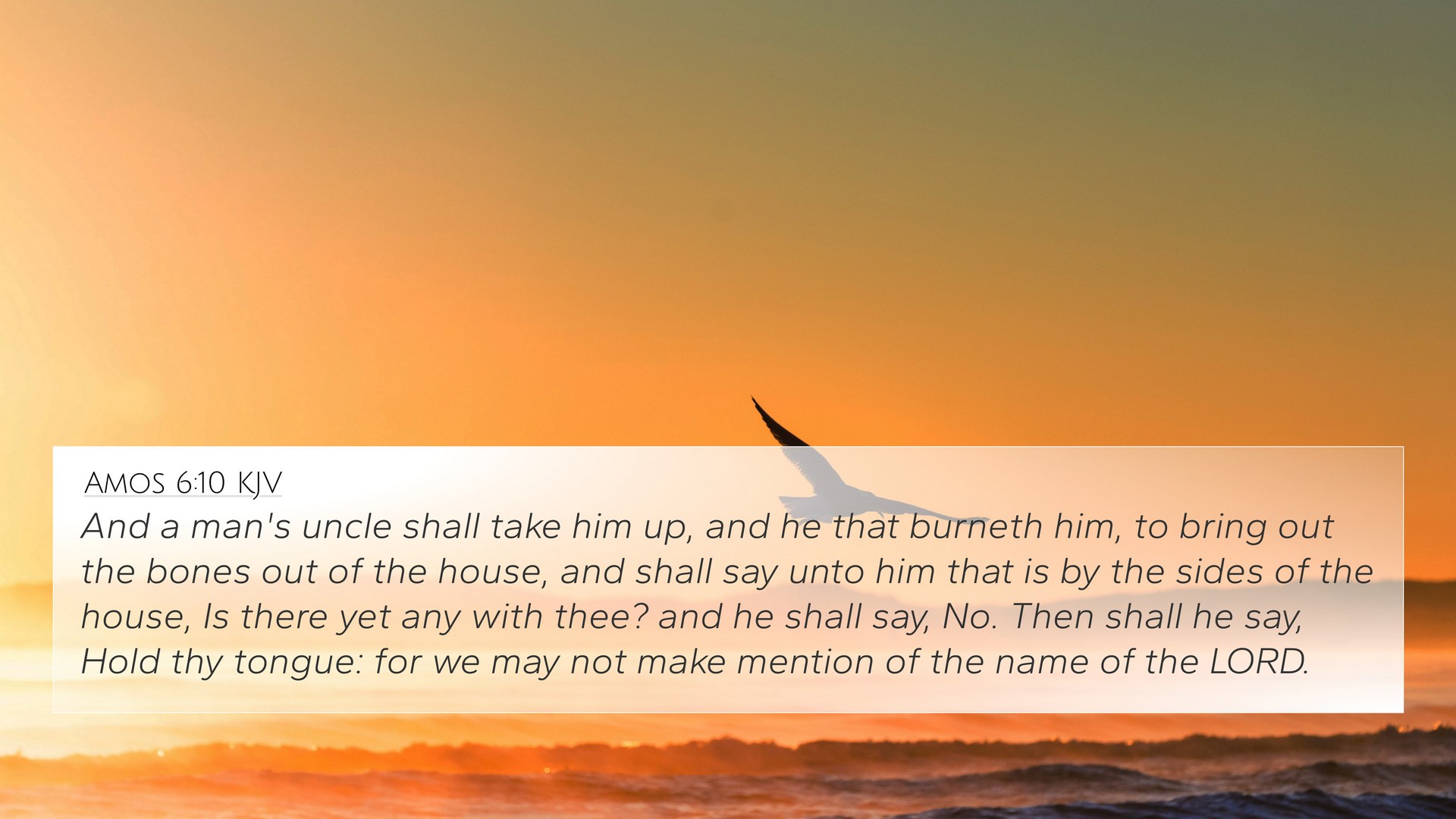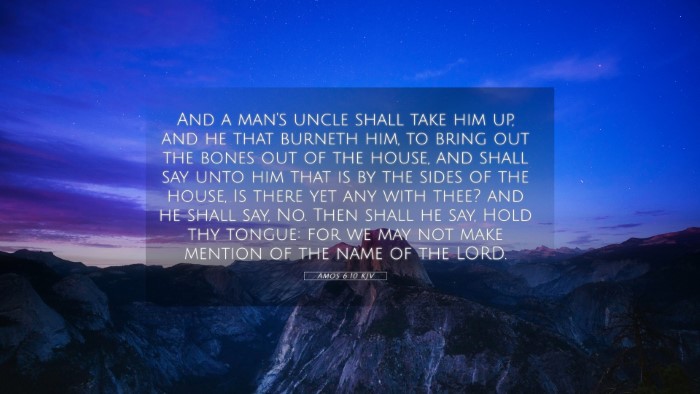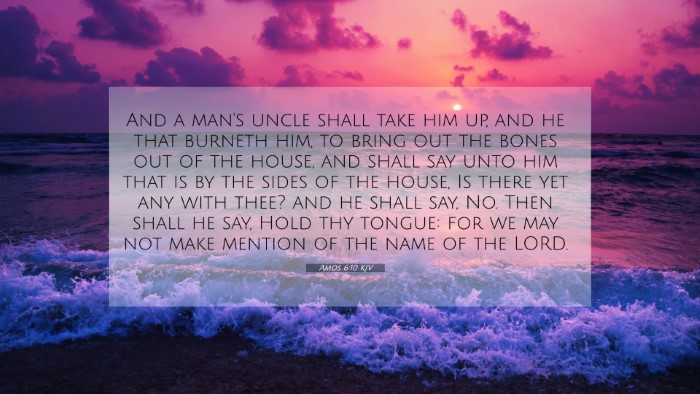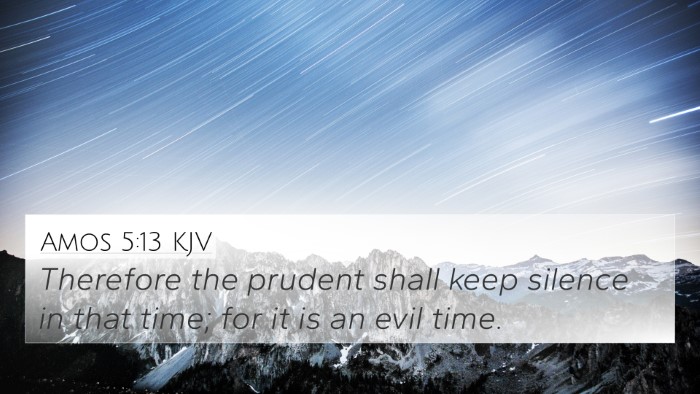Old Testament
Genesis Exodus Leviticus Numbers Deuteronomy Joshua Judges Ruth 1 Samuel 2 Samuel 1 Kings 2 Kings 1 Chronicles 2 Chronicles Ezra Nehemiah Esther Job Psalms Proverbs Ecclesiastes Song of Solomon Isaiah Jeremiah Lamentations Ezekiel Daniel Hosea Joel Amos Obadiah Jonah Micah Nahum Habakkuk Zephaniah Haggai Zechariah MalachiAmos 6:10 Similar Verses
Amos 6:10 Cross References
And a man's uncle shall take him up, and he that burneth him, to bring out the bones out of the house, and shall say unto him that is by the sides of the house, Is there yet any with thee? and he shall say, No. Then shall he say, Hold thy tongue: for we may not make mention of the name of the LORD.
Uncover the Rich Themes and Topics of This Bible Verse
Listed below are the Bible themes associated with Amos 6:10. We invite you to explore each theme to gain deeper insights into the Scriptures.
Amos 6:10 Cross Reference Verses
This section features a detailed cross-reference designed to enrich your understanding of the Scriptures. Below, you will find carefully selected verses that echo the themes and teachings related to Amos 6:10 KJV. Click on any image to explore detailed analyses of related Bible verses and uncover deeper theological insights.
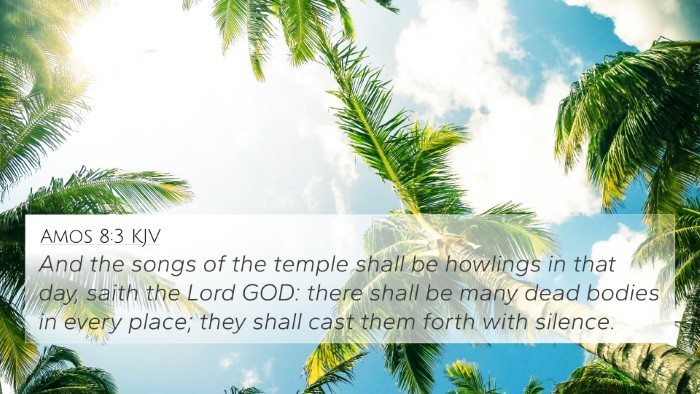
Amos 8:3 (KJV) »
And the songs of the temple shall be howlings in that day, saith the Lord GOD: there shall be many dead bodies in every place; they shall cast them forth with silence.
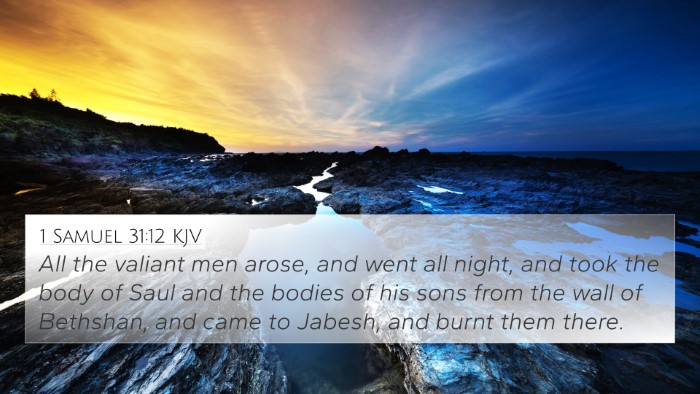
1 Samuel 31:12 (KJV) »
All the valiant men arose, and went all night, and took the body of Saul and the bodies of his sons from the wall of Bethshan, and came to Jabesh, and burnt them there.
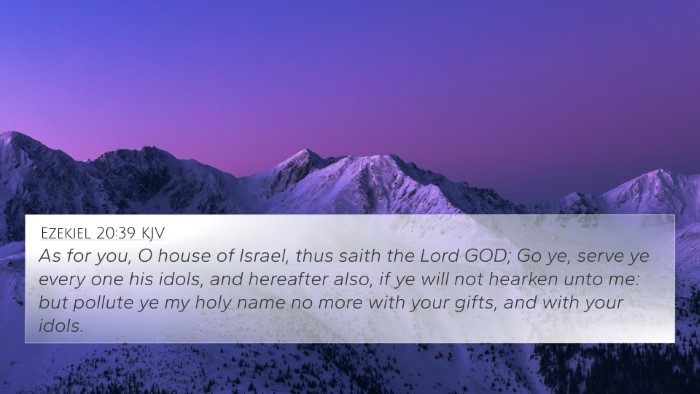
Ezekiel 20:39 (KJV) »
As for you, O house of Israel, thus saith the Lord GOD; Go ye, serve ye every one his idols, and hereafter also, if ye will not hearken unto me: but pollute ye my holy name no more with your gifts, and with your idols.
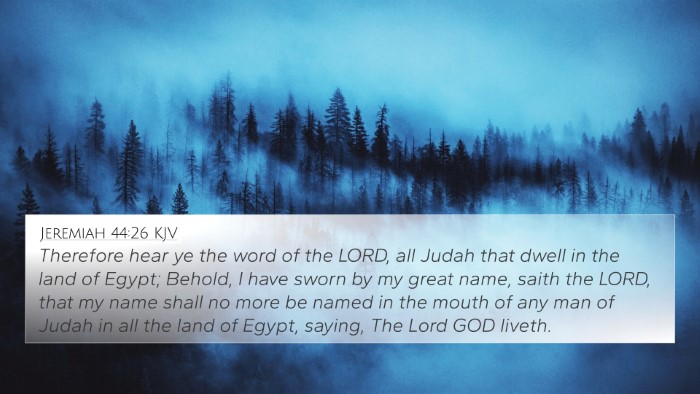
Jeremiah 44:26 (KJV) »
Therefore hear ye the word of the LORD, all Judah that dwell in the land of Egypt; Behold, I have sworn by my great name, saith the LORD, that my name shall no more be named in the mouth of any man of Judah in all the land of Egypt, saying, The Lord GOD liveth.
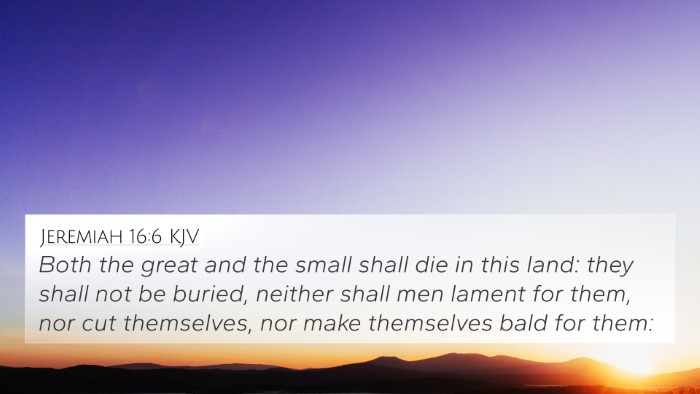
Jeremiah 16:6 (KJV) »
Both the great and the small shall die in this land: they shall not be buried, neither shall men lament for them, nor cut themselves, nor make themselves bald for them:
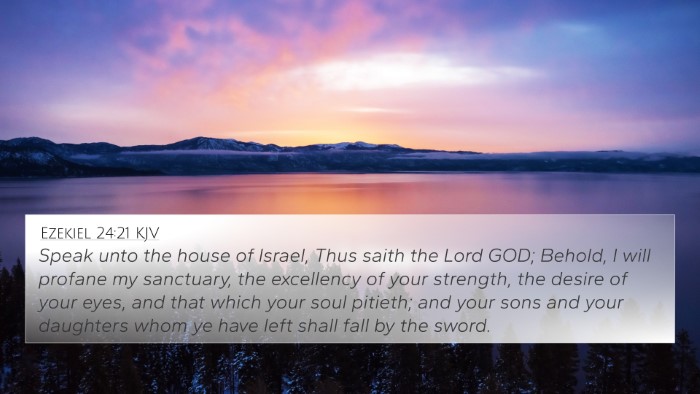
Ezekiel 24:21 (KJV) »
Speak unto the house of Israel, Thus saith the Lord GOD; Behold, I will profane my sanctuary, the excellency of your strength, the desire of your eyes, and that which your soul pitieth; and your sons and your daughters whom ye have left shall fall by the sword.
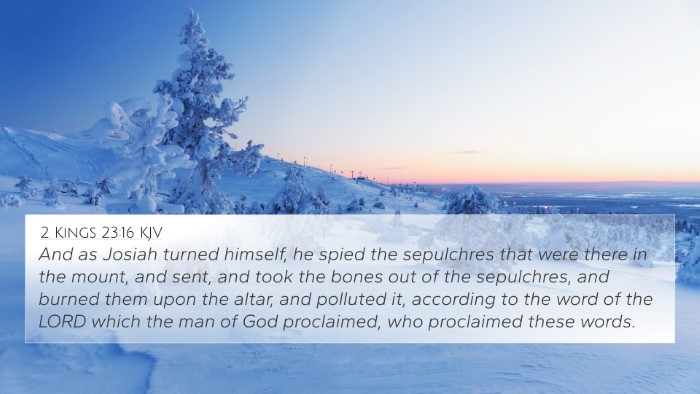
2 Kings 23:16 (KJV) »
And as Josiah turned himself, he spied the sepulchres that were there in the mount, and sent, and took the bones out of the sepulchres, and burned them upon the altar, and polluted it, according to the word of the LORD which the man of God proclaimed, who proclaimed these words.
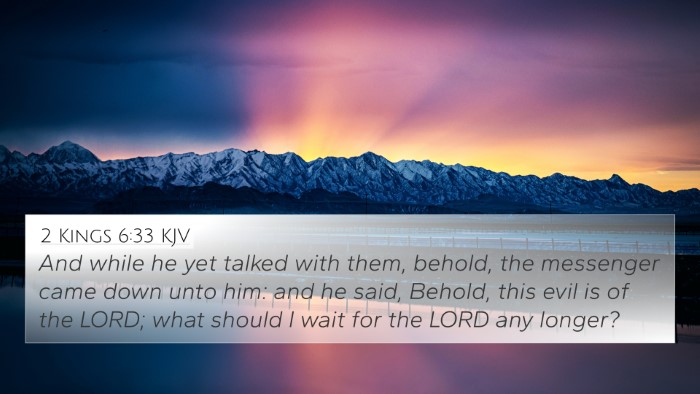
2 Kings 6:33 (KJV) »
And while he yet talked with them, behold, the messenger came down unto him: and he said, Behold, this evil is of the LORD; what should I wait for the LORD any longer?
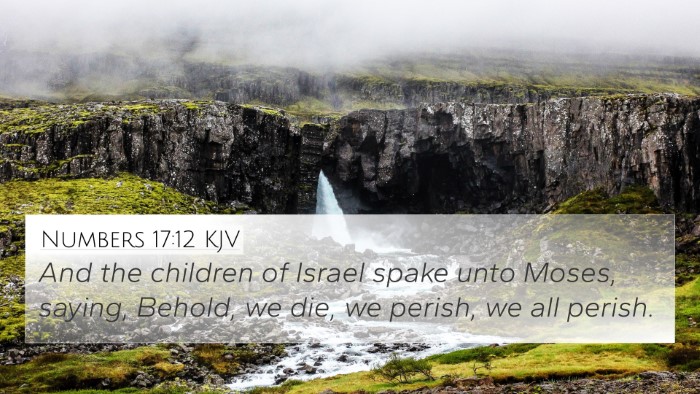
Numbers 17:12 (KJV) »
And the children of Israel spake unto Moses, saying, Behold, we die, we perish, we all perish.
Amos 6:10 Verse Analysis and Similar Verses
Understanding Amos 6:10
Amos 6:10 reads: "And if a man did flee unto the city, he shall be known by his name, and he shall be made known of the land where he is." This verse encapsulates the themes of historical accountability and the futility of seeking refuge among a people who have turned away from God's righteousness. In your study of the Bible, understanding verses like this can provide significant insight into the larger narrative and spiritual lessons present in Scripture.
Context and Background
Amos, one of the Minor Prophets, prophesied during a time of prosperity in Israel. However, this prosperity was marked by social injustice and a disregard for true worship. His messages often admonished the people for their complacency and disregard for God’s commands. This particular verse serves as a striking reminder of the consequences facing those who escape judgment yet remain unrepentant.
Interpretation and Analysis
Matthew Henry's Commentary: Matthew Henry emphasizes the futility of escaping divine judgment when God's presence and judgment can be found anywhere. The key takeaway is that no physical location can offer safety from God's justice if the heart is not aligned with Him. The essence of Amos 6:10 serves to underscore the idea that true refuge lies not in fleeing but in repentance and humility before God.
Albert Barnes' Notes: Barnes indicates that the verse illustrates the inevitable revelation of one's character and actions, regardless of the place of refuge. He urges readers to reflect on the importance of inner purity, which cannot be hidden from God. This verse also leads to the notion that a person's reputation and true nature will eventually surface, asserting the idea that God knows the hearts of all men.
Adam Clarke's Commentary: Adam Clarke highlights the societal implications of the verse. He posits that the cities of refuge mentioned in the earlier books of the Bible provided physical safety but lacked spiritual redemption. This spiritual context encourages a deeper reflection on our need for genuine repentance rather than merely seeking escape from consequences.
Key Themes
- Judgment and Accountability: The verse indicates that individuals must face the consequences of their actions and cannot escape God's judgment, no matter where they run.
- The True Nature of Safety: Physical places offer no spiritual security; true safety is found in a relationship with God.
- Character Revealed: Ultimately, one’s true nature and moral standing will be made known, as no one can hide from God.
Bible Verse Cross-References
For a better understanding of Amos 6:10, consider these cross-referenced verses:
- Jeremiah 23:24: "Can anyone hide himself in secret places, so I shall not see him?" This verse echoes the theme of God's omnipresence and the impossibility of hiding from Him.
- Proverbs 15:3: "The eyes of the Lord are in every place, keeping watch on the evil and the good." This further emphasizes God's watchfulness over humanity.
- Psalm 139:7-10: "Where can I go from Your Spirit? Or where can I flee from Your presence?" This passage beautifully complements the message in Amos about the inescapability of God's presence.
- Hebrews 4:13: "And there is no creature hidden from His sight, but all things are naked and open to the eyes of Him to whom we must give account." This reiterates the idea of accountability before God.
- Ezekiel 18:30: "Therefore I will judge you, O house of Israel, every one according to his ways, says the Lord God." This verse reinforces the theme of personal accountability in relation to God.
- James 1:22: "But be doers of the word, and not hearers only, deceiving yourselves." A reminder that true safety lies in honoring God through actions, not just words.
- Romans 14:12: "So then each of us shall give account of himself to God." This underscores the personal responsibility each individual bears before God.
Conclusion
The study of Amos 6:10 provides a rich tapestry of themes that resonate not just within the Old Testament but also find their echoes in New Testament teachings. The interconnectedness of Scripture can be profoundly enlightening, demonstrating how these verses work together to reveal God's nature and our responsibility as His followers.
Thematic Bible Verse Connections
Understanding how different passages relate to each other enhances our comprehension of Biblical teachings. By utilizing tools for Bible cross-referencing and a Bible concordance, you can unpack deeper meanings and connections, enriching your inquiry into the Scriptures.
